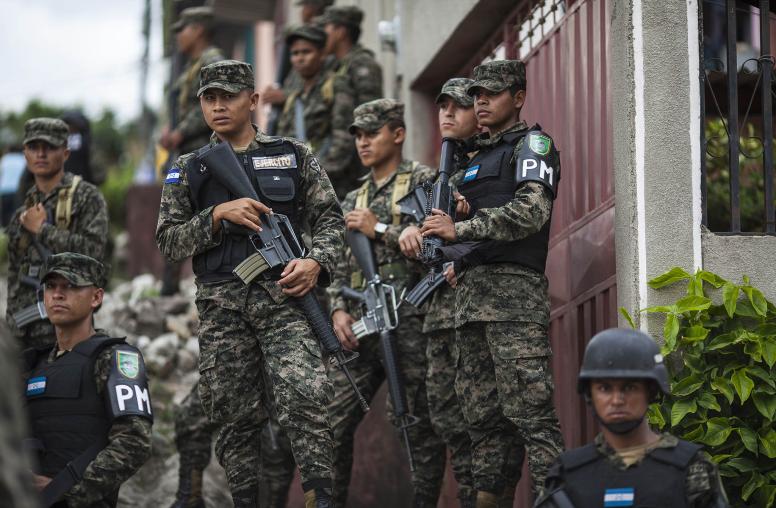Displaced to Cities: Conflict, Climate Change, and Rural-to-Urban Migration
Countries as geographically diverse as Honduras, Jordan, and Pakistan are experiencing a common challenge—rapid growth in urban populations as conflict and climate-induced disasters push people from rural areas into cities. This report examines the effects of this increased urban migration on both the migrants and the urban environment, as well as the challenges policymakers face. It offers recommendations to help meet the needs of growing urban populations and develop adaptive, resilient systems to better withstand the impacts of climate change and conflict.

Summary
Cities increasingly bear the brunt of climate-induced migration, particularly in conflict-affected countries. Armed conflict and the climate crisis interact in complex and reinforcing ways to undermine human security, leading to increasing trends in rural-to-urban migration and the rapid growth of informal or peri-urban settlements in many low- and middle-income countries. In the 25 years leading up to 2015, the population living in informal areas increased by 28 percent according to UN-Habitat. The World Bank estimates that by 2050, climate change could force the internal migration of over 200 million people, most of whom would move to these already densely populated urban areas. In addition, more than 100 million people were internally displaced in 2022 alone due to conflict, with most conflict-driven migrants also moving to urban areas.
This report focuses on elucidating linkages between climate, conflict, and rural to-urban migration in three countries: Honduras, Jordan, and Pakistan. The case studies draw upon expert interviews, fieldwork by the authors, and a review of secondary sources.
In Honduras, agricultural workers, making up 39 percent of the population, are made vulnerable by the increasing frequency and intensity of droughts and hurricanes, while rural migrants to cities must contend with organized gangs and high rates of urban violence. In Jordan, increasing water scarcity and lack of adequate rural jobs drive migration to cities, most of which already host large refugee populations from protracted conflicts in Iraq, Palestine, and Syria. In Pakistan, climate disasters such as the devastating 2022 floods are more frequent; they affect both rural areas and urban cores and help drive the growth of extensive informal peri-urban settlements, already home to large numbers of conflict-driven refugees.
This report analyzes the impacts on cities and migrants of the climate-conflict-migration nexus. As the cases highlight, with rapid influxes of people displaced by climate and conflict, urban areas face increased pressures on infrastructure, public services, and environmental quality. Ultimately, these pressures directly impact urban residents and can contribute to increased tensions between long-term residents and migrants. Combined with the chronic violence and crime common in urban areas, migrants are made vulnerable to physical and mental health challenges. However, governance mediates these negative impacts, and policy measures could promote positive feedback loops for economic and human development.
The report concludes with recommendations for policymakers designed to promote inclusive urban development and proactive, comprehensive policies that benefit both rural and urban communities. Given that much urban planning has failed to cope with rapid urbanization generally and with climate- and conflict-induced migration more specifically, recommendations for local urban institutions focus on strengthening government engagement and capacity for building urban residents’ trust in government, building social cohesion between newcomers and long-term residents, providing essential services (such as low-cost water, energy, and sanitation services), and increasing investments in climate adaptation measures.
At the national level, recommendations prioritize empowering local institutions and facilitating international cooperation by decentralizing authority to local officials, investing in the development of smaller cities, implementing flexible labor laws, addressing root causes of migration (including relevant priorities in national planning documents), and advocating for international protections for climate- and conflict-displaced persons.
About the Report
This report analyzes the linkages between climate change, conflict, and migration to urban environments in middle- and low-income countries. The report draws upon expert interviews, fieldwork, and a review of secondary sources to develop case studies of conflict-driven rural-to-urban migration in Honduras, Pakistan, and Jordan. The report was commissioned by USIP’s Climate, Environment, and Conflict program.
About the Authors
Gabriela Nagle Alverio is a JD-PhD candidate in environmental policy at Duke University studying climate migration and conflict. Jeannie Sowers is chair of the Political Science Department at the University of New Hampshire, where she specializes in comparative and environmental politics in the Middle East and North Africa. Erika Weinthal is a professor of environmental policy and public policy at Duke University, where she specializes in global environmental politics and environmental security.


